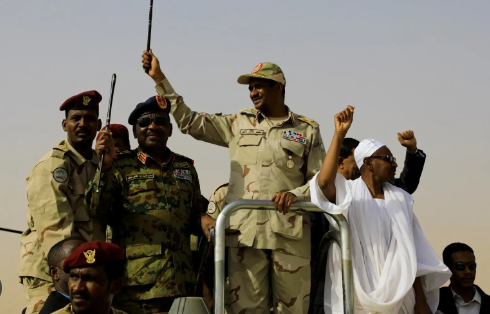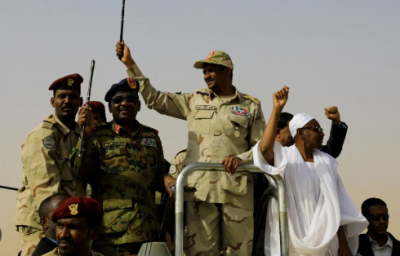The Rapid Support Forces have evolved in Sudan from a militia to a border guard, and then built an empire through gold mining control, becoming the main player in a war with the army that has plunged the country into an unending civil war.
**Hemeti**
Lieutenant General Mohamed Hamdan Dagalo, also known as Hemeti, held the position of Vice President of the ruling Sovereign Council before the outbreak of the war in Sudan. Analysts estimate the number of Rapid Support Forces to be about 100,000 personnel, with bases spread throughout the country.
**War with the Army**
The Rapid Support Forces have been engaged in a war with the army since April 15, resulting in a significant humanitarian crisis in the region. Rapid Support fighters continue to battle despite air strikes carried out by the army.
**Janjaweed Militia**
The Rapid Support Forces emerged from the Arab Janjaweed militia that fought in the Darfur conflict in the early 2000s, which was utilized by the then-ruling Omar al-Bashir regime to assist the army in suppressing the rebellion. The conflict has displaced approximately 2.5 million people and resulted in the deaths of 300,000. The International Criminal Court has accused government officials and leaders of the Janjaweed militia of committing genocide, war crimes, and crimes against humanity in Darfur, though no charges were brought against Hemeti.
**Border Guard**
Over time, the forces grew and were used particularly as border guards to tighten restrictions on irregular migration. Additionally, Hemeti’s business interests expanded, and he and his family extended their assets in gold mining, livestock, and infrastructure.
In 2015, the Rapid Support Forces, alongside the Sudanese army, began deploying troops to participate in the war in Yemen alongside Saudi and Emirati forces, allowing Hemeti to establish relations with the two Gulf powers.
**Security Force**
In 2017, Sudan enacted a law granting the Rapid Support Forces the status of an independent security force. Military sources indicated that the army leadership had long expressed concern over the growth of Hemeti's forces.
**Coup**
In April 2019, the Rapid Support Forces participated in the military coup that overthrew al-Bashir. Later that year, Hemeti signed a power-sharing agreement that granted him the position of Vice President of the transitional Sovereign Council headed by Lieutenant General Abdel Fattah al-Burhan. Before the signing in 2019, activists accused the Rapid Support Forces of participating in the killings of dozens of protesters demanding democracy, and human rights organizations also alleged that Rapid Support soldiers engaged in tribal violence. Hemeti lifted the immunity of some soldiers to allow for their prosecution and later apologized for the state crimes against the Sudanese people without going into detail.
The Rapid Support Forces were also involved in the October 2021 coup that disrupted the transitional process towards elections. Hemeti later expressed regret over the coup and expressed his agreement to enter a new agreement to restore complete civilian governance before elections.
**Integration**
The Sudanese army and pro-democracy forces demanded the integration of the Rapid Support Forces into the regular army. This topic, along with the chain of command within a new transitional plan, contributed to the outbreak of conflict.




